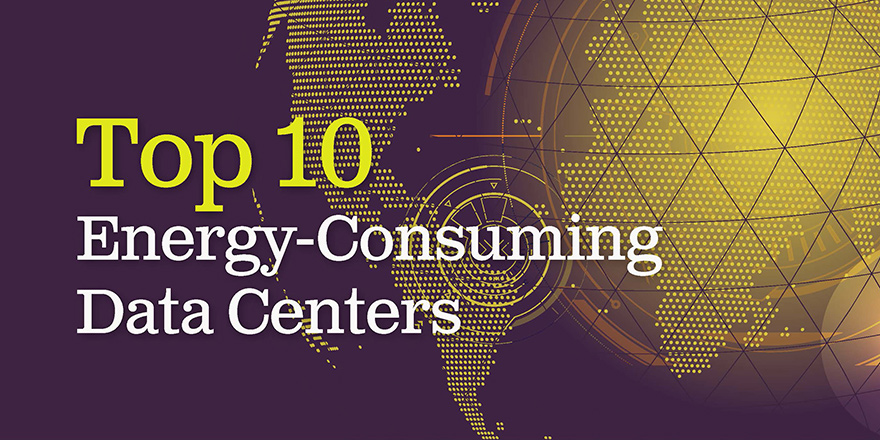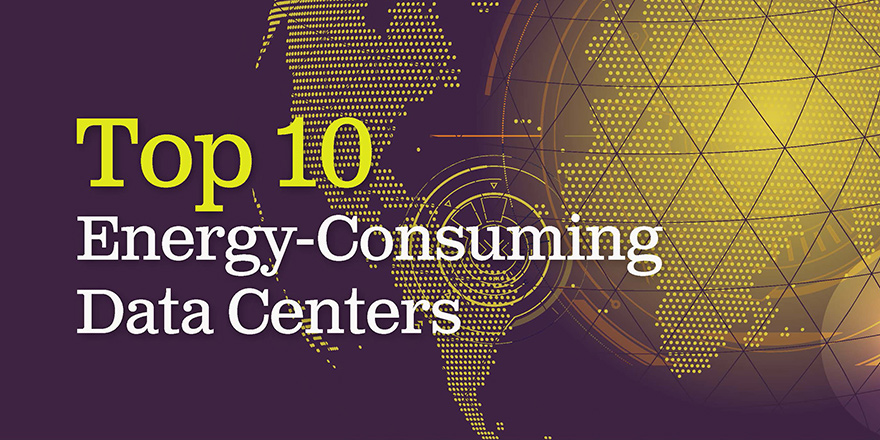

Top 10 Energy-Consuming Data Centers
Large-scale data centers are critical for meeting the demands of the private and public sectors throughout the world, but they require massive amounts of energy to operate. Today, data centers consume around 2% of all electricity worldwide, and that figure could rise as high as 8% by 2030. Since energy consumption at these levels may present an environmental impact, many organizations are pioneering green technologies and sustainable practices in their data centers to offset their carbon footprint. The following ten data centers represent the top energy-consuming data centers in the world:
#1 China Telecom’s Inner Mongolia Information Park
Energy Consumption: 150 MW
Location: Hohhot, China
#2 China Mobile’s Hohhot Data Center
Energy Consumption: 130 MW
Location: Hohhot, China
#3 China Mobile’s Harbin Data Center
Energy Consumption: 120 MW
Location: Harbin, China
#4 Range’s International Information Hub
Energy Consumption: 115 MW
Location: Langfang, China
#5 China Unicom’s Northwest Data Center
Energy Consumption: 110 MW
Location: Hohhot, China
#6 China Mobile’s Southern Logistics Center
Energy Consumption: 102 MW
Location: Hohhot, China
#7 China Telecom’s Guizhou Information Park
Energy Consumption: 100 MW
Location: Guizhou, China
#8 NSA’s Utah Data Center
Energy Consumption: 90 MW
Location: Bluffdale, UT
#9 Digital Realty’s Lakeside Technology Center
Energy Consumption: 85 MW
Location: Chicago, IL
#10 Tulip’s Data City
Energy Consumption: 80 MW
Location: Bangalore, India
Benefits of Data Centers
Large data centers may require great amounts of energy to operate, but this is essential to maintain the storage space, processing power, and data necessary to deliver services and satisfy customers. By consolidating compute devices, data centers enable the high levels of reliability needed for the modern web services and applications that keep us happy, healthy, and safe. Without data centers, many companies would not be able to exist, consumers and businesses would be left displeased, and we would miss out on many technological advancements. Some of the benefits data centers provide when compared to distributed compute are:
Reliability and uptime. Data centers provide the infrastructure needed to ensure uptime for mission-critical services.
Energy-efficiency. Many data centers are very energy-efficient to reduce power and cooling costs to comply with government and industry regulations.
Security. Great measures are taken to protect a data center’s building infrastructure and network from all threats including natural disasters and physical/cyber intrusions.
Societal benefits. Data centers are the foundation for many aspects of our lives including telecommunications, retail, social networking, finance, entertainment, and education.
Data Center Energy-Efficiency Technologies
Large-scale data centers may consume enough energy to power a town, but they are often extremely energy-efficient. Hyperscale data centers regularly claim Power Usage Effectiveness (PUE) figures between 1.1 and 1.4, indicating high levels of efficiency well ahead of the industry average of 1.67. The data center industry is trending to a smaller carbon footprint, pioneering green technologies such as:
Free cooling. United Airlines leverages advanced air-to-air heat transfer technology to maximize free cooling hours and reduce energy consumption by 420 million kWh over 10 years.
Solar and wind power. Facebook uses renewable and environment-friendly energy sources with stable costs with the goal of reducing CO2 emissions by 75%.
Reusing heat. In Sweden, DigiPlex and Stockholm Exergi use excess heat from servers to warm homes in nearby neighborhoods.
Modular data centers. eBay’s Utah facility is designed for rapid deployment, portability, and scalability, and boasts a power density of nearly 50 kW per rack.
Water cooling. Organizations have explored using the cooling power of seawater. Microsoft even experimented with submerging a self-contained data center underwater.
Geothermal and hydroelectric power. Verne Global’s facility in Keflavik, Iceland is 100% powered by sustainable geothermal and hydroelectric power.
Artificial intelligence. Google implemented a self-taught algorithm to adjust cooling systems that led to energy savings of 40%.
Storage technologies. Batteries and other energy storage options can be utilized when renewable sources such as sunlight or wind are temporarily unavailable.
Alternative fuels. Apple combines two 100-acre solar farms plus a bio-gas generator fueled by methane from nearby landfills to power its Maiden, NC facility.
How DCIM Software Improves Efficiency
Driving efficient use of energy resources is a top priority for any data center, and many organizations are turning to Data Center Infrastructure Management (DCIM) software to minimize data center energy consumption while maximizing operational efficiency. DCIM software enables data center managers to:
Measure energy usage to have the intelligence needed to make smarter energy management decisions
Calculate Power Usage Effectiveness (PUE) to measure the effectiveness of energy-efficiency initiatives
Create billback reports to drive more energy-efficient behavior
Avoid overcooling and wasting energy resources by showing compliance with ASHRAE standards
Identify power profiles for each compute device to better locate power hogs and replace them by virtualization or with energy-efficient equipment
Conclusion
Large-scale data centers consume massive amounts of energy, but many are improving their efficiencies to help offset their carbon footprint. In the U.S., after many years of rapidly rising energy use, consumption plateaued in 2010 and has held steady since. Encouraging figures like this demonstrate that the data center industry is a leader in sustainability and will continue to innovate with energy-efficient practices and technologies such as DCIM software. However, not all data centers are focusing on environmental-friendliness. Therefore, it may be necessary for regulatory agencies to take a stronger stance on the sustainability of these facilities moving forward.
Sources
https://fortune.com/2019/09/18/internet-cloud-server-data-center-energy-consumption-renewable-coal/
http://worldstopdatacenters.com/power/
https://journal.uptimeinstitute.com/is-pue-actually-going-up/
https://www.computerweekly.com/feature/Top-technologies-that-can-make-your-datacentre-green
https://www.vice.com/en_us/article/evpz9a/how-oceans-are-being-used-to-cool-massive-data-centres
https://www.technologyreview.com/s/611902/google-just-gave-control-over-data-center-cooling-to-an-ai/
https://www.enterpriseai.news/2018/08/28/facebook-datacenters-nearing-green-energy-goal/
https://www.zdnet.com/article/this-data-centers-excess-heat-will-help-warm-thousands-of-homes/
https://www.informationweek.com/data-centers/green-data-centers-8-companies-doing-them-right/d/d-id/1326498
https://www.zdnet.com/article/data-centers-becoming-more-energy-efficient-thanks-in-part-to-cloud-computing/
http://kyotocooling.com/data-center-cooling-united-airlines/
https://www.datacenterknowledge.com/archives/2013/09/26/ebay-goes-live-with-its-bloom-powered-data-center





























